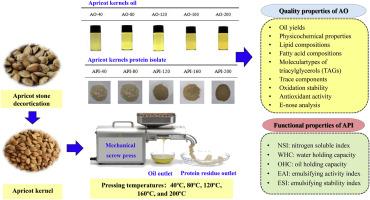Effect of screw pressing temperature on apricot (Prunus armeniaca L.) kernels oil quality properties and apricot kernels protein isolate functional properties
IF 6
1区 农林科学
Q1 FOOD SCIENCE & TECHNOLOGY
引用次数: 0
Abstract
This study evaluated the effects of screw pressing temperature (40 °C–200 °C) on the yields, physicochemical properties, oxidation stabilities, and antioxidant activities of apricot kernels oil (AO). Additionally, this study comparatively analyzed the functional properties of different apricot kernels protein isolates (APIs). The oil yield ranged from 30.06% to 49.07% with AO-200 showing the highest yield. Compared with cold pressing, high-temperature pressing significantly increased the trace components (such as total phenols, tocopherols, and phytosterols), oxidation stabilities, and antioxidant activities of AOs. High-temperature pressing also increased the functional properties of API. Multivariate analysis revealed that spiral pressing at 120 °C may be an optimal strategy for obtaining high-quality oil and protein isolate from apricot kernels. These findings provide a theoretical basis for the extraction and application of AO and API.

螺旋压榨温度对杏核(Prunus armeniaca L.)油质特性和杏核蛋白质分离物功能特性的影响
本研究评估了螺旋压榨温度(40 °C-200 °C)对杏核油(AO)的产量、理化性质、氧化稳定性和抗氧化活性的影响。此外,本研究还比较分析了不同杏核蛋白分离物(APIs)的功能特性。出油率从 30.06% 到 49.07% 不等,其中 AO-200 的出油率最高。与冷榨相比,高温压榨显著提高了杏核蛋白分离物的微量成分(如总酚、生育酚和植物甾醇)、氧化稳定性和抗氧化活性。高温压榨还提高了原料药的功能特性。多变量分析表明,120 °C的螺旋压榨可能是从杏核中获得高品质油和蛋白质分离物的最佳策略。这些发现为杏仁油和原料药的提取和应用提供了理论依据。
本文章由计算机程序翻译,如有差异,请以英文原文为准。
求助全文
约1分钟内获得全文
求助全文
来源期刊

LWT - Food Science and Technology
工程技术-食品科技
CiteScore
11.80
自引率
6.70%
发文量
1724
审稿时长
65 days
期刊介绍:
LWT - Food Science and Technology is an international journal that publishes innovative papers in the fields of food chemistry, biochemistry, microbiology, technology and nutrition. The work described should be innovative either in the approach or in the methods used. The significance of the results either for the science community or for the food industry must also be specified. Contributions written in English are welcomed in the form of review articles, short reviews, research papers, and research notes. Papers featuring animal trials and cell cultures are outside the scope of the journal and will not be considered for publication.
 求助内容:
求助内容: 应助结果提醒方式:
应助结果提醒方式:


